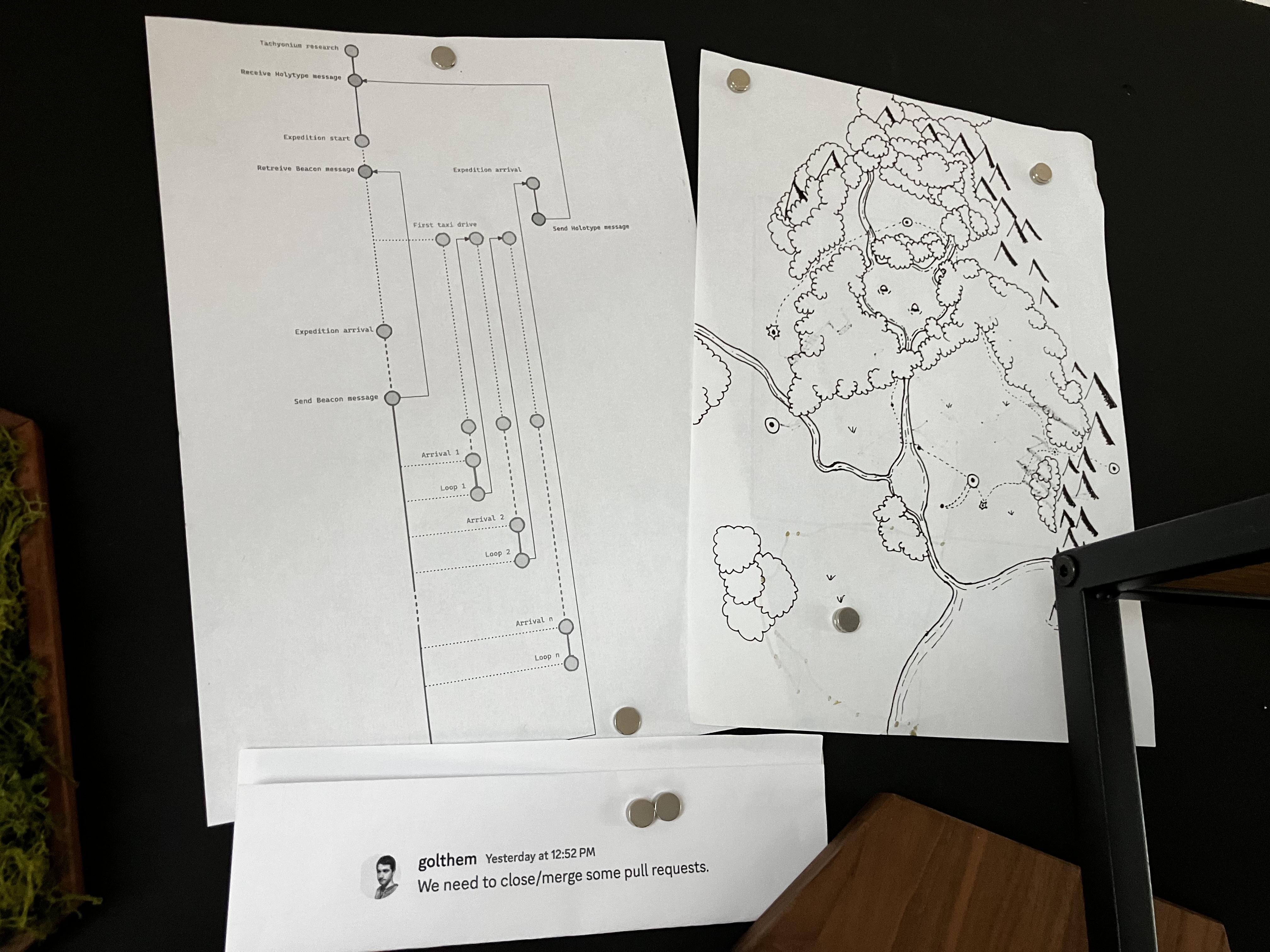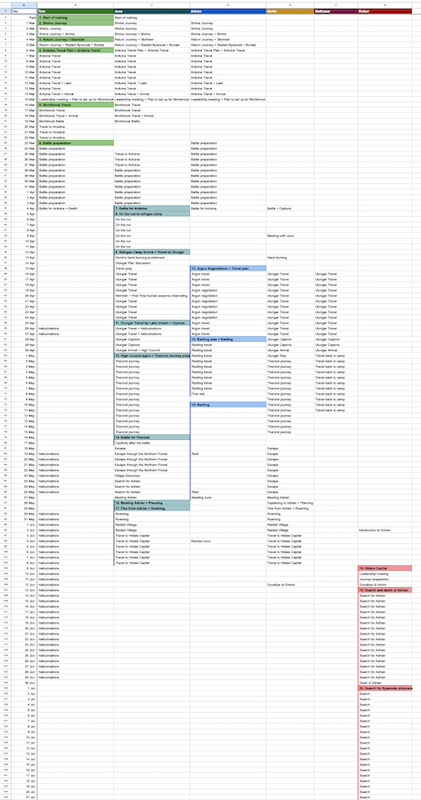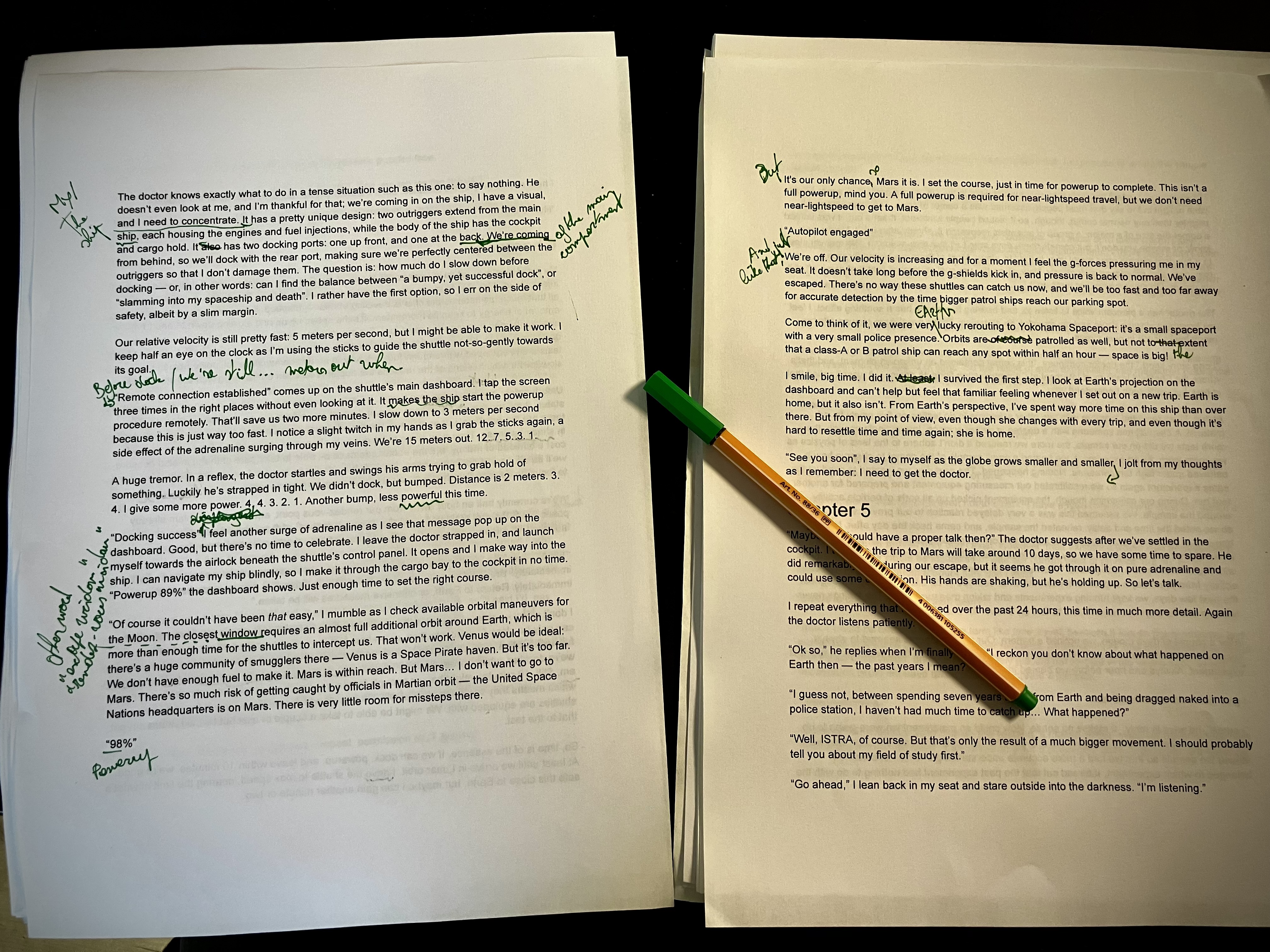Things I learned writing a fiction novel
Written on 2024-10-30Monday was a pretty big day: I published my sci-fi novel Timeline Taxi! I had so much fun writing it, and want to share some takeaways with you. This will be a random collection of lessons learned, I hope you find it interesting.
Warning: there will be spoilers!
From idea to paper
I came up with the core idea for the story while I was traveling for work. I was struggling to fall asleep in my hotel room, and suddenly a random interesting idea came into existence: "time dilation as a service". Time dilation in itself is a supporting theme in many sci-fi books, but it's never used as the main subject. I was intrigued and thought about it some more.
I set a kind of weird rule for myself: don't write anything down yet. If this idea was interesting enough, I knew it would follow me around. If it was too boring, I'd forget about it, and that would be fine as well.
Obviously, it stuck 😁 During the next weeks, I thought about it occasionally, but never to the point where I came up with the full plot. I was simply thinking about the mechanics, how "time dilation as a service" would work.
At one point though, out of nowhere, I came up with the title "Timeline Taxi". It just suddenly popped into my head when I was making lunch in the kitchen. I don't know why, but knowing the title acted like a catalyst: I scribbled it down, together with a couple of themes and keywords. The next day, I actually started writing. I think I wrote around 6000 words in that first session, and another ±10.000 words in the days to come. Eventually the book would end up counting slightly more than 20.000 words, which is rather short, but I'll come back to that later in this post.
First person
One thing I realised pretty early was that writing fiction is something entirely different from writing technical content. Dialog took a lot of practice, and I also noticed that I felt more comfortable writing in first person rather than third. I didn't let that hold me back: I embraced the first-person perspective for the main narration, and actually came to really like it. I find that it pulls the reader more into the story, as if they are the main character instead of watching the main character. This is also why I decided not to name the pilot — the protagonist: I want the reader to feel as if they are the main character themselves.
The timeline
Timeline Taxi's main plot revolves around time travel (although you probably only realise the extent of it at the very end of the book). One thing I did to understand the timeline, the loops, and to make sure all events lined up properly; was to draw it in some sort of diagram. I hung it up on my wall together with some other things that inspire me. Every morning I look at these papers, and am reminded of the things I'm working on.

Visualizing the timeline was a huge productivity boost for me. You should know that I'm a procrastinator, but having a simple paper on the wall helped me a lot. It was such an inspiration that I even included it in the cover of the book.
I also spent enough time verifying measurements — I'd hate to get the basic maths wrong. I actually had to rewrite parts of the story to make sure everything lined up. Part of the job!

There's actually another novel I'm writing, which I haven't talked about in public yet. It has a pretty complicated timeline as well (yes, I blurred it on purpose):

Publishing drafts
Like I said: I'm new to fiction. I had no idea if what I was writing was any good. At the start, that didn't bother me all too much, because I had fun writing, and mainly thought of this project as something for myself. I had a story to tell, and I wouldn't measure "success" by how many people would read it.
Nevertheless, imposter syndrome is a thing. Over time, you begin to hope that people find the thing you create good; and so my measurement of success shifted. I was drawn into the story, and wanted to share it with people. So, I figured: let's publish some early drafts on this blog. If it sucks, people will tell me, and I would prevent making a total fool of myself early on.
Of course, the fear of "making a fool of myself" is a lie, it's the imposter syndrome speaking, but it feels real.
Luckily, the response wasn't negative. There was some good feedback, some people genuinely interested even. Sure, it wasn't going viral, but that was ok. It gave me enough confidence that this might be something at least some people would enjoy reading. It gave me the courage to continue.
Beta reading
When I completed the story, I knew there was a lot of finetuning to do. Sure, part of that feeling was driven by imposter syndrome, but part is also common sense: no one gets it right the first take. I never get it right from the first try writing code, so I figure I don't get it right first time with fiction either. I asked some people to beta read. Not too many, because too many opinions can have a paralyzing effect, but at least some.
The feedback from that handful of beta readers was super valuable. I got to fix lots of small details, clarified confusion sections, and the overall story improved a lot.
Pen and paper
The final review was done by myself. With pen and paper. I don't know why, but printing out the script and making corrections with a pen acted as a catalyst on its own. It felt… so much more tangible, all of a sudden. I reviewed the script in full over two days, and was really happy with the process. I actually longed for reading more during the day when I was working or taking care of the kids. A good sign.

Part 2
One thing I'm kind of unsatisfied with, is the length of the novel: it only counts 20k words. An average reader will read it in 1 to 2 hours.
There is actually a big part of the story that I didn't write, but have drafted in my mind. With it, the book would probably double in size. This part tells the story of doctor Russell and his team, the origin of the holotype message, as well as the involvement of the UN and USN.
So, why didn't I add it?
Well, I had a hard time fitting it together in a way that made sense, without spoiling the main twist of the story early on. If you've read the book, you know that the end contains a pretty big twist, and I always thought it was the perfect ending. My all-time favorite movie is The Prestige, which was a big inspiration for the structure of this book as well: it hints to something all throughout the movie, but you only get to see the twist during the last five minutes. I wanted this book to have that same feeling.
So I brainstormed a couple of approaches of telling the story of doctor Russell:
- Mix up chapters, one telling the story the pilot, then one about doctor Russell, then one back to the pilot, and so on. This would either spoil too much early on, or it would be pretty boring.
- Have three parts within the book, the first part tells the story of the pilot up until their deep sleep to the Oort Cloud, then I'd tell the story of doctor Russell, then I'd go back to the final part with the twist. This approach has the same problem as option one.
- Tell the story of doctor Russell in hindsight, maybe as a flashback, right after the twist (when he's flying back to Earth and recording his logs). This eliminates the spoiler part, but it would also feel pretty cheesy and rushed to do it as a flashback.
Unfortunately, I couldn't find a solution that I was happy with. Meanwhile, I found that the story "as is" could be told on its own as well. So rather than ending up in limbo where I never published anything, I eventually decided to publish the story as is for now.
I might write a second part in the future, I might rework the current book, but I'm not sure yet.
Pricing
That brings us to the final question: pricing. Beware that imposter syndrome plays a big part in this decision as well. "What if people buy it, but don't like it? They'll think I'm a fraud. Maybe I should make it free to avoid any problems? Maybe it should be super cheap, a single dollar or something."
On the other hand: I know how much time I spent on it, and I know I like it. I know my beta readers liked it. So I figured, how much does a Subway sandwich cost? 5 to 10 euros? Do I think Timeline Taxi is worth the same as a Subway sandwich? I do. I even think it will be more enjoyable than a Subway sandwich. Is that too big a claim to make? No, I'm fairly confident saying that.
So, Subway sandwich pricing it is. I settled on 8 euros, and we'll have to see how it turns out.
Well, it has been a journey. I've written a fiction novel! And even if no one buys it, I'll be happy with what I achieved (some people have bought it already, so it's already a double-win). I managed to write a story, out of nothing, and make it into a finished, published book. I learned new ways of dealing with imposter syndrome, and found ways to stay motivated instead of procrastinate.
All of that, yes, that's an achievement I'm proud of.
